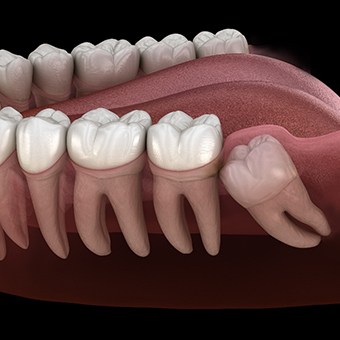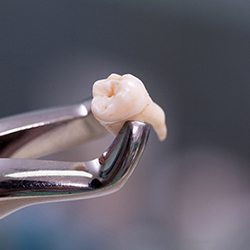Wisdom Tooth Extractions – McKinney, TX
Fast & Pain-Less Wisdom Tooth Extractions

While our paleolithic ancestors once used their wisdom teeth to help chew through tough meats and hard nuts and berries, today, we don’t have much use for these third molars. In fact, many dentists often advise patients to remove them because they pose a threat to their future oral health, like crowding and a high risk of infection. If you still have your wisdom teeth, whether they’re erupted or impacted, our team at Oakbrook Dental & Orthodontics can extract them to preserve your dental health. Call us today to schedule a consultation and learn more!
Why Choose Oakbrook Dental & Orthodontics for Wisdom Tooth Extractions?
- We Treat Patients of All Ages
- Extended Evening & Saturday Hours
- Insurance Accepted & Maximized

What are Wisdom Teeth?
Wisdom teeth are the last teeth that erupt, typically between the ages of 17 and 24. They’re located behind the second molars, and while some people may have all four of them, others only have one, two, or three. This is largely dependent on your genetics and the unique development of your body. A very small percentage of people never develop their wisdom teeth at all.

Why Do Wisdom Teeth Need to Be Removed?
Wisdom teeth don’t always need to be extracted. In fact, our team at Oakbrook Dental & Orthodontics always weigh the risk of an invasive procedure like wisdom tooth extraction in McKinney against its possible adverse impacts on your oral health. If we believe that the pros of treatment far outweigh the cons, we may advise you to schedule your extraction after your consultation. This is typically in the following cases:
- They’re impacted below the gumline
- An infection has developed or you’re at a high risk of developing one
- Persistent or severe pain towards the back of your mouth
- There’s not enough room in your mouth for your wisdom teeth to grow in

What to Expect from the Extraction Process
The extraction process will largely depend on the location of your wisdom teeth. For example, if your teeth are impacted below the gumline, you’ll likely need oral surgery, which our experts at Oakbrook Dental & Orthodontics are able to complete in-office. This will involve creating a small window in your gumline to gain access to the third molars underneath. We’ll then gently remove them from the arch. In some cases, we may need to separate them into smaller pieces to do this.
If your wisdom teeth have erupted through the gumline, the process is much simpler. Using an instrument called an elevator, we’ll gently lift the teeth from the gumline. Then, we’ll grip onto the tooth with a pair of dental forceps and slowly wiggle it free of any connective tissues and remove it.

Recovering from Wisdom Tooth Extractions
After your treatment, our team will provide you with detailed post-operative instructions on how to care for your recovering smile. Some general tips we recommend are:
- Eat a soft diet following your procedure.
- Don’t drink using a straw to prevent dry socket.
- Stop using tobacco products and drinking alcohol until your mouth fully recovers.
- Avoid strenuous activity and exercise for the following one to two weeks.
- For swelling, place a cold compress on your cheek.
If you have any questions or concerns, please don’t hesitate to contact us.
Wisdom Tooth Extractions FAQs
Should Wisdom Teeth Be Removed If They Don’t Hurt?
If your wisdom teeth grow in straight, there is enough room in your mouth for them, and their presence doesn’t result in any pain, then you likely won’t have to get yours removed. However, it’s important that we mention here that pain isn’t the only reason that the third set of molars needs to be pulled. If there is a risk for infection, cysts, or orthodontic issues, then we will recommend moving forward with this procedure for the sake of your oral and overall health.
Is Wisdom Tooth Removal Painful?
You might be surprised to hear that you won’t feel any discomfort in the treatment chair. That’s because the first step of the entire process is the same whether we are removing one tooth or all four wisdom teeth: numbing your mouth. Following your procedure, it is normal to feel some soreness surface as the numbing agents wear off. Don’t worry – we’ll provide you with aftercare instructions to help with this as well, including using a cold compress for 10 minutes at a time and taking OTC pain medication as directed on the label.
How Should I Prepare for My Wisdom Tooth Extraction?
We already covered what to do after your procedure, but is there anything you should do beforehand to make the entire process more seamless? The answer is “yes!” In addition to arranging for a trusted adult to drive you home from your appointment, we recommend not smoking, not drinking alcohol, and stocking your nightstand or the table next to your couch with everything you need, like bottles of water, soft snacks, and over-the-counter pain medication.
What Can I Eat After Wisdom Tooth Surgery?
Your mouth will still be numb in the hours following your procedure, so it’s important that you don’t eat anything during this time. Once you regain full feeling, you should eat something like plain yogurt or oatmeal, which is healthy, low in sugar, and doesn’t require much chewing. Make sure that you check the temperature of your food beforehand too. If it’s extremely hot or cold, it can lead to considerable discomfort.
Does Everyone Have Wisdom Teeth?
Actually, anywhere from 5% to 37% of people don’t have wisdom teeth! It’s believed that genetics are a contributing factor. So, if your mother or father’s third set of molars never made an appearance, there’s a chance that the same will happen to you!
How Do You Make Wisdom Teeth Pain Go Away?
If your emerging wisdom teeth are resulting in considerable pain, then there’s really only one solution: having them extracted. That said, there are a few ways you can alleviate your discomfort in the short-term, like rinsing with warm saltwater, using a cold compress or towel-wrapped icepack in 10-minute intervals, and taking OTC pain medication as directed on the label. Again, these are all short-term measures, and they should only be used as such.

